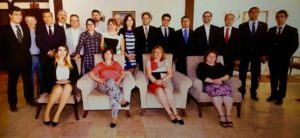Fostering the development of entrepreneurial skills and improvement of the capacities of organizations in the areas of inclusion of inmates.
On 22nd and 23rd June the second project team of ECOPRIS (Portugal, Romania, Turkey, EuroPris) meeting took place in Ankara, Turkey.
In the first months, the project worked on the development of a comparative analysis for prison work models. This tool will give an overview of how prison work is organized in different countries and provides for some cases of success and failure.
Another part of the meeting was a visit to the prison work workshops of the Sincan open prison, that is part of a prison complex built in 2000 and comprising of 8 prisons (including female, juvenile, high security) with 6500 detainees. 640 prisoners are In the open prison and almost all of them are working in the production of furniture, textiles, agricultural products and a kitchen that has to cater for 9000 persons daily.
The ECOPRIS project holds in its core objectives to prepare prison staff to create and manage “prison work”; to provide opportunities for inmates’ skills development; and also to increase the generation of own funds to be allocated to the fulfillment of prisons’ mission. Within this scope, one of the key outputs focus on challenging the following question: How is prison work organized in European prison systems?

This is one of the main questions that ECOPRIS project addresses under output 1 – Prison work models critical review. We started in December 2014 by gathering and reviewing EU prison models and programs, which resulted in a prison work comparison framework proposal.
The framework was then pre-tested by core partners; Portuguese, Turkish and Romanian prison services; and the first associated partner Belgian prison service. The pre-test sustained the final prison work framework structure in April 2015.
The next step will be to collect from each country 4 successful prison work models (best practices) and 4 unsuccessful models using the validated framework. The 3 most promising practices will be inserted in the “Training Comparison Framework Catalogue” to be delivered by the end of August.
The prison work comparative framework establishes a comparison in terms of five major dimensions:
(1) Concepts, scope and modalities;
(2) Management & structure;
(3) Market;
(4) Marketing & communication;
(5) Labour Reintegration.
Learn more about this project: ECOPRIS.
